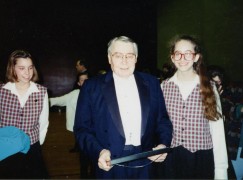An Open Letter to the ASO Board Posted on January 27, 2015 by saveoursymphonyatl To: Mr. Terry Neal, Interim President
and Board of Directors, Atlanta Symphony Orchestra
From: Save Our Symphony Atlanta
Dear Mr. Neal and Board,
Our readers (your constituents) are growing frustrated. Your marketing messages are untimely, incomplete, grammatically incorrect, and sloppy. Your website is convoluted and does not work well. You don’t take full advantage of social media. SOSA supporters tell us that they find better, more timely information from us than the ASO.
On December 4, 2014, SOSA posted A Vote of “No Confidence” expressing our concerns regarding marketing at the Atlanta Symphony Orchestra. We began looking for improvements starting December 5th, hoping Mr. Petroccione, then head of your marketing department, would have read our post and taken the message to heart. It’s been almost two months and sadly, there has been no progress and we note that Mr. Petroccione has moved to Vice President for Strategic Initiatives and System Improvements. (Really? really?) Maybe we weren’t succinct enough, so let us simply state our position:
ASO Marketing is failing and tickets sales are suffering as a result.
Maybe we weren’t detailed enough, so let us clearly explain the issues:
First and foremost, you need to hire someone who proofreads everything you post online. We understand that the marketing department is short staffed, but virtually everything we see posted has typographical errors. Consistent errors reflect on the professionalism and reputation of the organization.
ASO Website
Error messages, outdated information, and misspellings continue to plague the website. The following is just a sample of what we have found:
Read more in the full letter.
and Board of Directors, Atlanta Symphony Orchestra
From: Save Our Symphony Atlanta
Dear Mr. Neal and Board,
Our readers (your constituents) are growing frustrated. Your marketing messages are untimely, incomplete, grammatically incorrect, and sloppy. Your website is convoluted and does not work well. You don’t take full advantage of social media. SOSA supporters tell us that they find better, more timely information from us than the ASO.
On December 4, 2014, SOSA posted A Vote of “No Confidence” expressing our concerns regarding marketing at the Atlanta Symphony Orchestra. We began looking for improvements starting December 5th, hoping Mr. Petroccione, then head of your marketing department, would have read our post and taken the message to heart. It’s been almost two months and sadly, there has been no progress and we note that Mr. Petroccione has moved to Vice President for Strategic Initiatives and System Improvements. (Really? really?) Maybe we weren’t succinct enough, so let us simply state our position:
ASO Marketing is failing and tickets sales are suffering as a result.
Maybe we weren’t detailed enough, so let us clearly explain the issues:
First and foremost, you need to hire someone who proofreads everything you post online. We understand that the marketing department is short staffed, but virtually everything we see posted has typographical errors. Consistent errors reflect on the professionalism and reputation of the organization.
ASO Website
Error messages, outdated information, and misspellings continue to plague the website. The following is just a sample of what we have found:
- To the Board – You might want to note that Stanley Romanstein’s picture is still on the ASO website on your Newsroom page, under Leadership Biographies. His biography has been removed but his picture is still used for the Biography tab and featured on the Biographies page. How long has Mr. Neal been interim president? His bio is on the Woodruff website. Why is it not on the ASO newsroom page?
- Under the Plan Your Visit section, the Restaurants, Bars & Lounges, and Hotel are still not functional and bring up an ugly yellow page of code. Wouldn’t it be nice for people who take advantage of your Valentine’s Day concerts with a couples’ getaway – dinner, concert and an overnight away from the kids? They can’t get there from your site.
- Teen Night at the ASO? It was held this last Saturday; however, the FAQ tells the teen that they can pick up their tickets the day of the concert, November 22nd.
- We’ll let you see if you can find the error under American Roots Music.
- Your rotating ASO players under your calendar? Keith Buncke has a blank picture and no biography. Will he be gone before you ever get this fixed?
Read more in the full letter.

 RSS Feed
RSS Feed